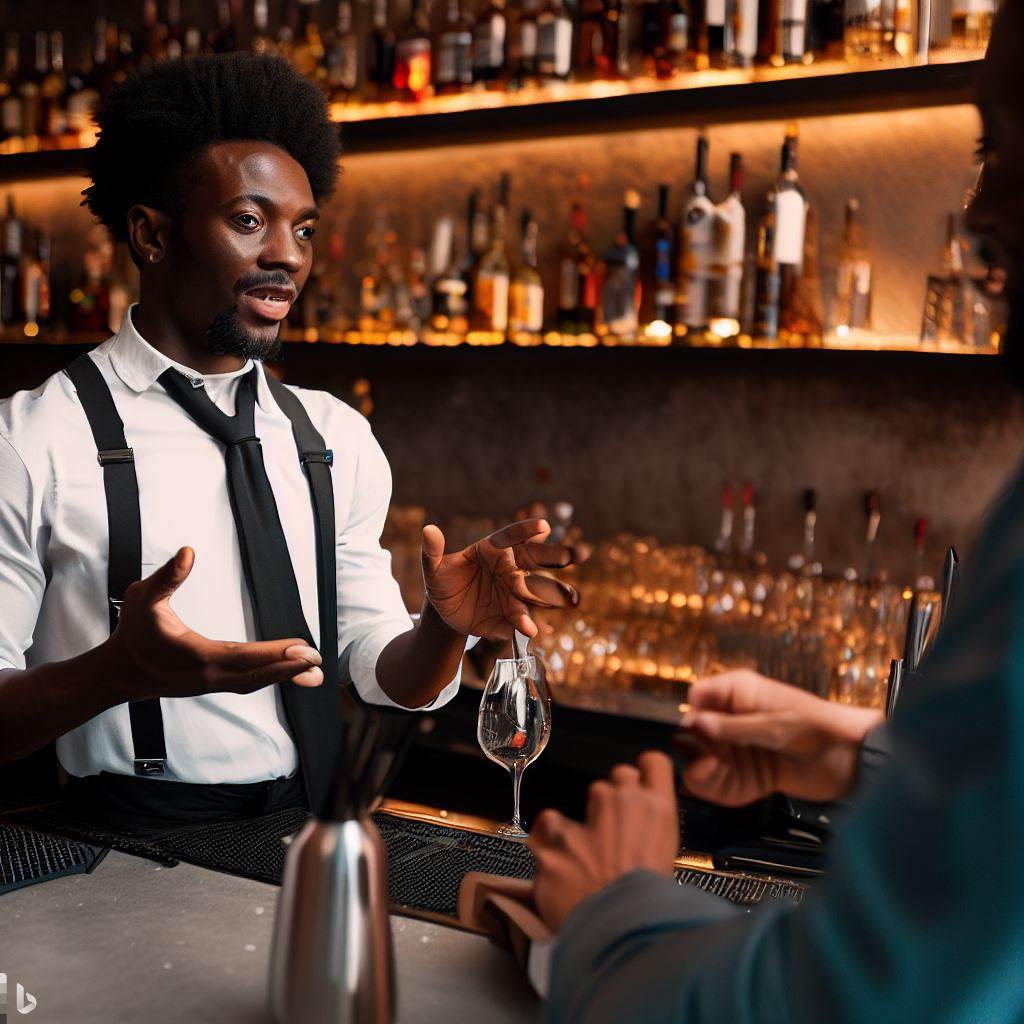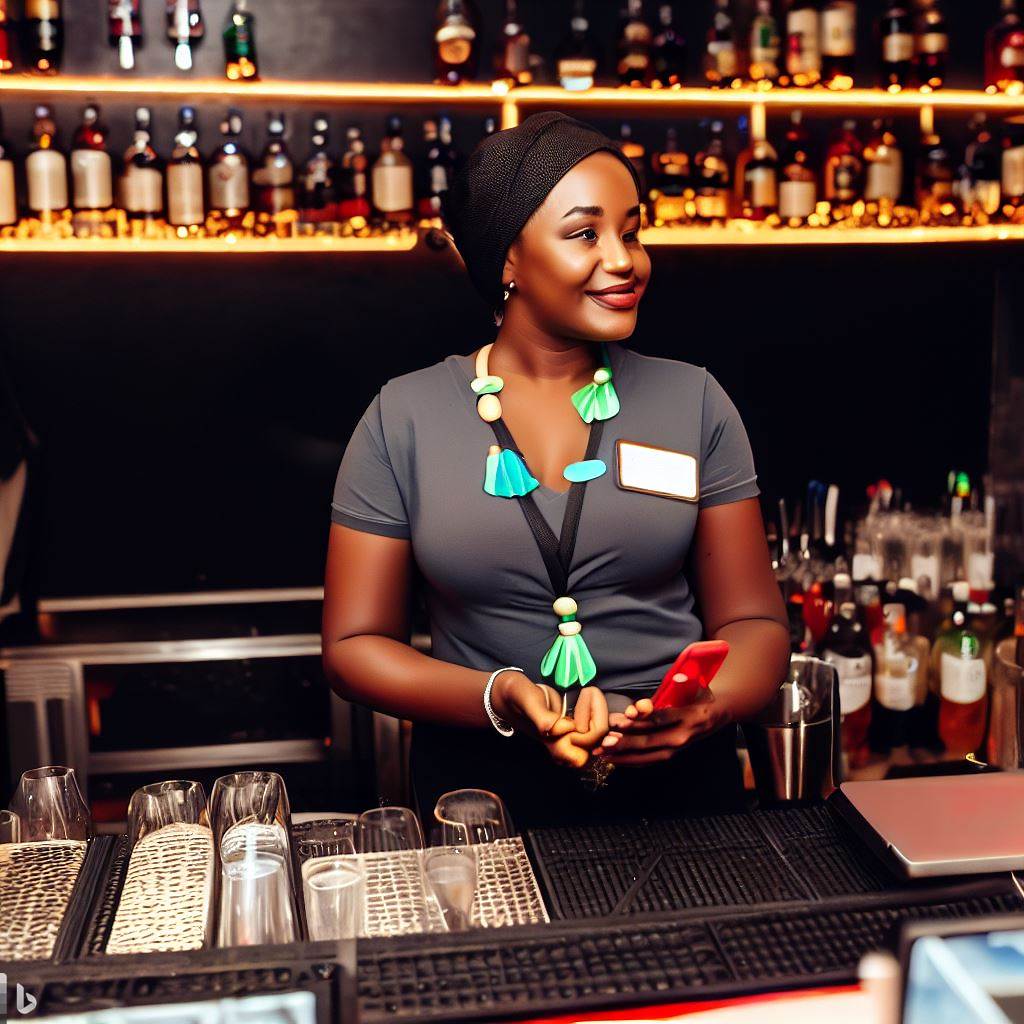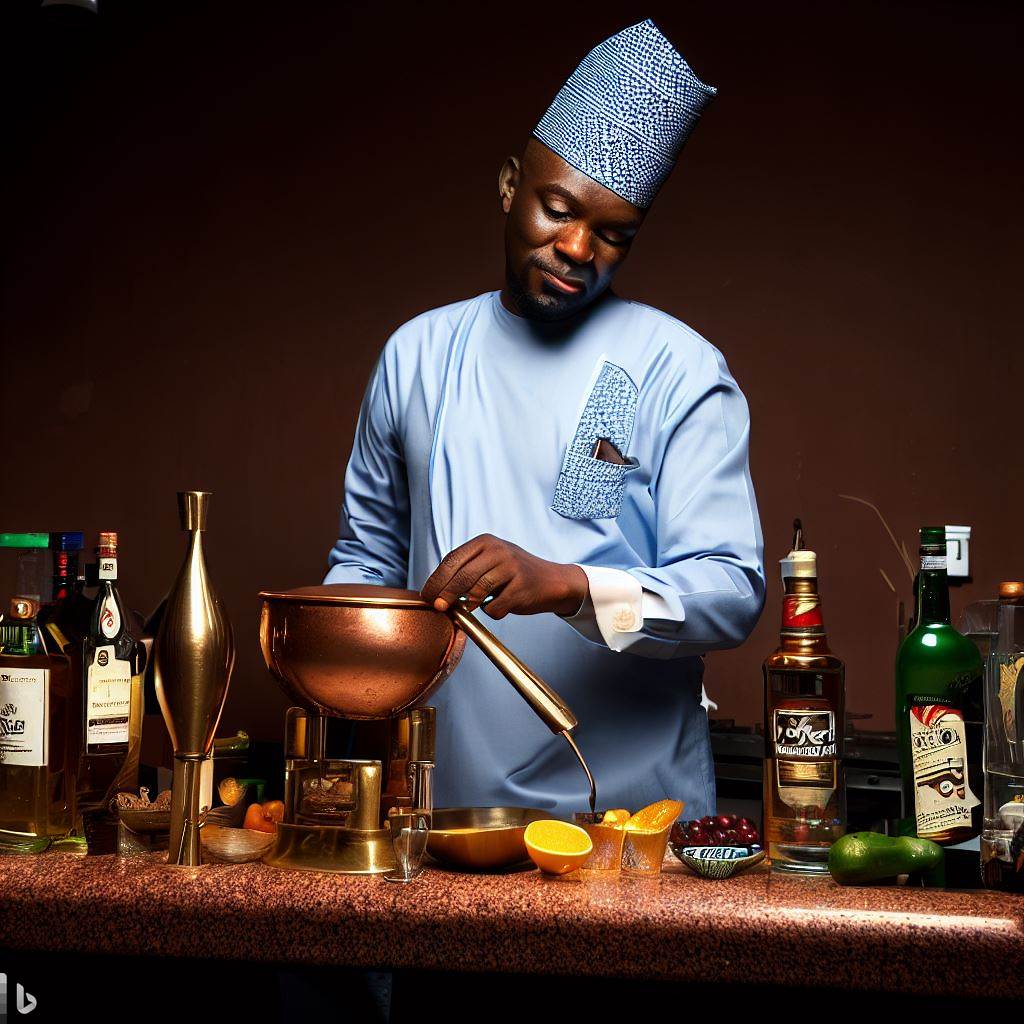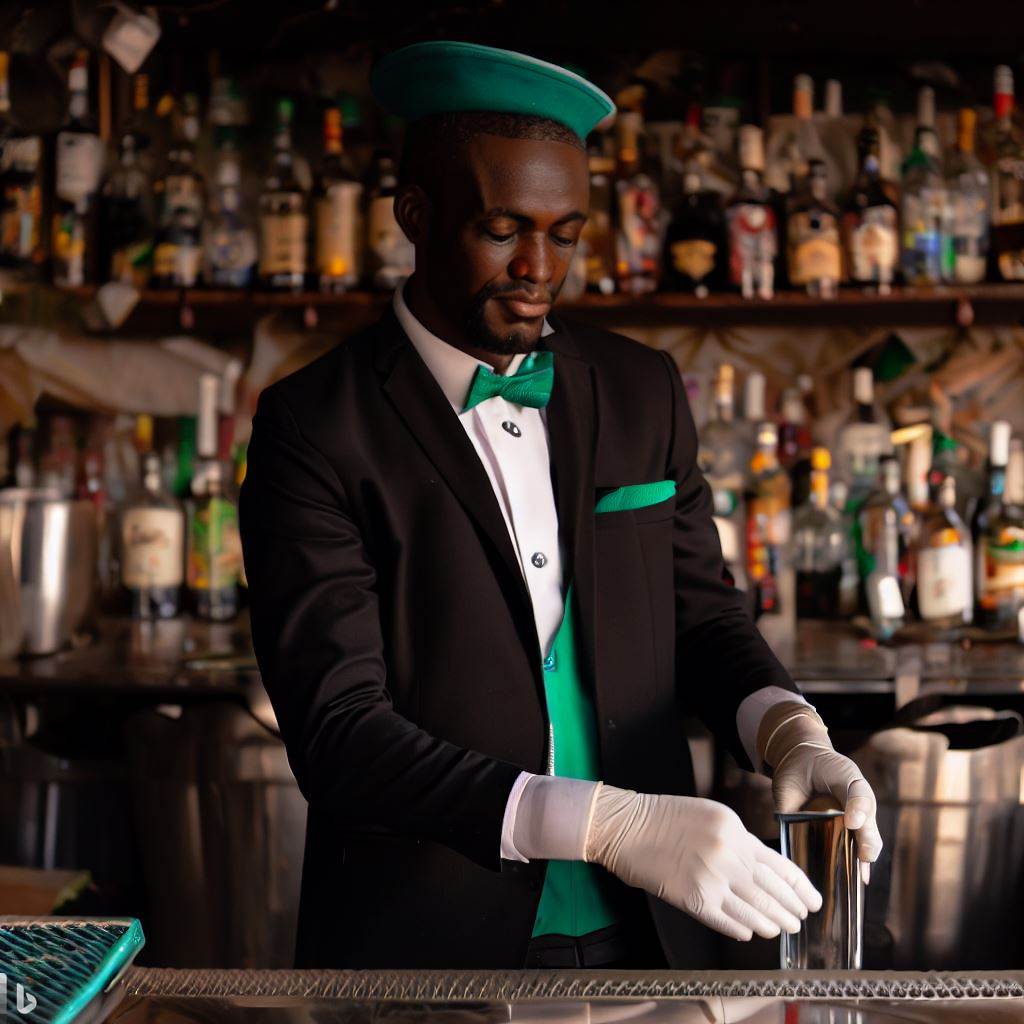Introduction
Cocktail culture in Nigeria is an intriguing subject that deserves exploration. As a bartender in Nigeria, I have firsthand experience and insights into this fascinating aspect of Nigerian nightlife.
Why is cocktail culture in Nigeria so intriguing? The answer lies in the unique blend of rich cultural traditions and modern influences.
Nigeria, with its diverse ethnic groups and vibrant city life, creates a captivating environment for the evolution of cocktail culture.
As a bartender in Nigeria, I have personally immersed myself in this dynamic culture. Working in bars and clubs across the country, I have witnessed the growth and transformation of cocktail culture.
From experimenting with local ingredients to incorporating global trends, Nigerian mixology is constantly evolving.
My journey as a bartender started in Lagos, the bustling metropolis known for its vibrant nightlife. The energy and creativity of the cocktail scene drew me in.
The city’s cosmopolitan nature provided me with ample opportunities to learn and experiment with a wide range of flavors and techniques.
Moving beyond Lagos, I ventured into other Nigerian cities, each with its distinctive cocktail culture.
From the lively streets of Abuja to the coastal vibes of Port Harcourt, I have had the privilege to interact with diverse crowds and witness the regional variations in cocktail preferences.
Throughout my career, I have seen how cocktail culture in Nigeria has become more than just a trend. It has become a form of self-expression, a way for Nigerians to embrace their cultural heritage while embracing global influences.
This blog post aims to delve deeper into this fascinating subject, exploring the history, trends, and future possibilities of cocktail culture in Nigeria. So, join me as we embark on this exciting journey!
The History of Cocktail Culture in Nigeria
The influence of colonialism on the introduction of cocktails
- During colonial rule, British expatriates brought their drinking culture to Nigeria.
- Cocktails became popular among the elites who adopted the Western lifestyle.
- Colonial establishments and social clubs were the first to serve cocktails in Nigeria.
Traditional Nigerian beverages and their evolution
- Before the introduction of cocktails, Nigeria had a rich tradition of local beverages.
- Palm wine, zobo, kunu, and burukutu were consumed for their refreshing and medicinal properties.
- Over time, these traditional beverages began to incorporate Western influences and ingredients.
Limited availability and access to international spirits
- In the early years, access to international spirits was limited in Nigeria.
- Importation of spirits was expensive, making them inaccessible to the majority of Nigerians.
- This limited the availability of ingredients necessary for making cocktails.
Rise of cocktail bars and mixology as a profession
- In recent years, there has been a surge in cocktail bars and mixology in Nigeria.
- Cocktail competitions and events have become popular, showcasing the talent of Nigerian mixologists.
- Young Nigerians have embraced mixology as a profession and are creating innovative and unique cocktails.
- Cocktail culture has evolved from being elitist to being enjoyed by people from diverse backgrounds.
The Nigerian Palate and Cocktail Preferences
Nigerian taste preferences in alcoholic beverages
- Nigerians have a strong affinity for strong and bold flavors in their alcoholic beverages.
- Whiskey, vodka, and gin are some of the most preferred spirits among Nigerians.
- The Nigerian palate tends to appreciate drinks that are rich, robust, and full-bodied.
- Sweet flavors are also favored, with fruity cocktails and liqueurs being popular choices.
- Nigerians enjoy drinks with a bit of a kick, often opting for cocktails with a spicy twist.
- Local spirits like palm wine and ogogoro are also consumed regularly, showcasing the love for traditional flavors.
- Nigerians appreciate well-balanced cocktails that showcase a variety of flavors in harmony.
- Some Nigerians prefer their cocktails to have a touch of bitterness, adding complexity to the overall experience.
- The taste preferences of Nigerians are diverse, ranging from bold and strong to sweet and fruity.
- Experimentation and customization are often encouraged in the Nigerian cocktail culture.
Popular Nigerian ingredients infused into cocktails
- Ginger is a commonly used ingredient in Nigerian cocktails, adding a spicy and refreshing kick.
- Local fruits such as mangoes, oranges, and pineapple are often incorporated into cocktails.
- Palm wine, a traditional Nigerian drink, is sometimes used as a base or flavoring agent in cocktails.
- Hibiscus, known locally as “Zobo,” is a popular ingredient that adds a unique floral and tangy flavor.
- Coconut water and coconut milk are frequently used to create creamy and tropical cocktails.
- Bitter leaf, a common Nigerian herb, is sometimes used to add a bitter note to cocktails.
- Nigerian spices like cloves, nutmeg, and cinnamon are often utilized to enhance the flavors of cocktails.
- Locally brewed beers, such as Nigerian lagers, are sometimes incorporated into beer-based cocktails.
- Nigerian ingredients bring a distinct and flavorful twist to classic cocktails.
- The use of local ingredients allows bartenders to create innovative and unique Nigerian-inspired cocktails.
The balance between sweet and bitter flavors in cocktails
- The Nigerian palate appreciates a well-balanced combination of sweet and bitter flavors in cocktails.
- This balance creates a sophisticated and harmonious taste experience.
- Some Nigerian cocktails showcase a more pronounced sweetness, appealing to those with a sweet tooth.
- Others have a subtle sweetness, allowing the bitterness to shine through.
- Creating the perfect balance requires skill and understanding of the Nigerian palate.
- Bartenders often experiment with different combinations of sweet and bitter ingredients to achieve the desired balance.
- The balance between sweet and bitter flavors adds complexity and depth to Nigerian cocktails.
- Nigerians appreciate the interplay between contrasting flavors in their cocktails.
- The balance between sweet and bitter flavors is a key aspect of Nigerian cocktail culture.
- Whether it’s a slightly bitter aftertaste or a burst of sweetness, Nigerian cocktails are designed to delight the palate.
Read: Legal Requirements for Bartending in Nigeria
Challenges Faced by Bartenders in Nigeria
Limited access to quality ingredients and international spirits
- Bartenders in Nigeria often struggle to find high-quality ingredients and international spirits for their craft.
- The limited availability of these ingredients hampers their ability to create unique and innovative cocktails.
- Many bartenders have to settle for using locally produced spirits, which may not match the taste and quality of international brands.
- The lack of access to quality ingredients restricts the growth and development of the cocktail culture in Nigeria.
High cost of imported spirits and its impact on cocktail prices
- Imported spirits often come with high price tags due to import duties and transportation costs.
- Bartenders are forced to pass on these high costs to consumers, resulting in expensive cocktails.
- The high cocktail prices discourage many potential customers from exploring the cocktail culture.
- This limits the customer base and potential revenue for bartenders, making it difficult for them to thrive in the industry.
Lack of formal training opportunities for bartenders
- Nigeria lacks formal training institutions dedicated to bartending, limiting the educational opportunities for aspiring bartenders.
- Without proper training, bartenders may lack the necessary skills and knowledge to excel in their profession.
- The absence of formal training also makes it challenging for bartenders to keep up with international trends and techniques.
- This gap in education hinders the overall growth and professionalism of bartending in Nigeria.
Cultural perceptions and prejudices against bartending as a profession
- In Nigerian culture, bartending is often seen as a low-status or unrespectable profession.
- Many people have preconceived notions that bartenders are not serious professionals, but rather individuals indulging in alcohol-related activities.
- These cultural perceptions and prejudices discourage many talented individuals from pursuing bartending as a career.
- The lack of recognition and respect for bartending further exacerbates the challenges faced by bartenders in Nigeria.
In fact, bartenders in Nigeria encounter several challenges that hinder the growth and development of the cocktail culture.
Limited access to quality ingredients and international spirits, high costs of imported spirits leading to expensive cocktails, lack of formal training opportunities, and cultural perceptions against bartending as a profession all contribute to these challenges.
Overcoming these hurdles will require efforts from both the industry and society to appreciate and support the bartending profession in Nigeria.
Read: The Art of Mixology: Bartending Trends in Nigeria
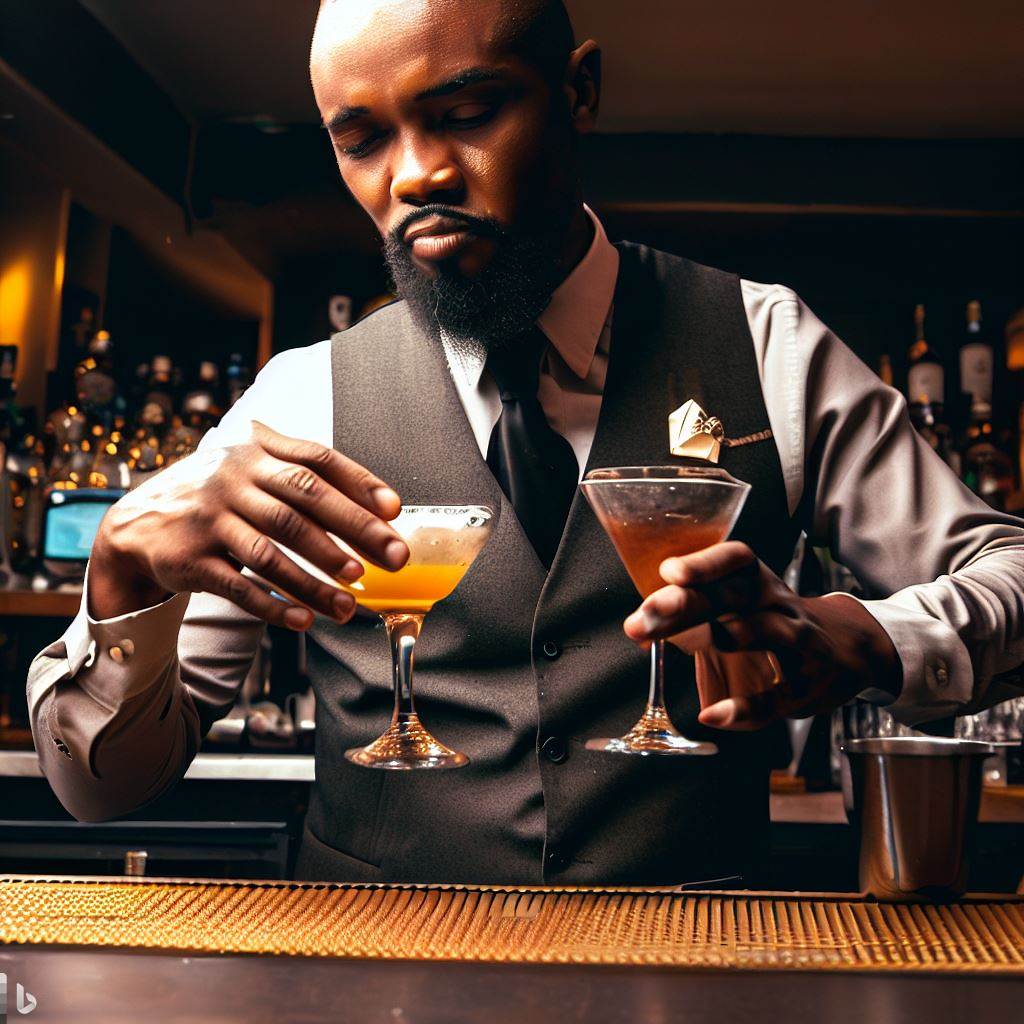
The Cocktail Revolution in Nigeria
Emerging local distilleries and their impact on cocktail culture
- The rise of local distilleries in Nigeria has greatly influenced the cocktail culture in the country.
- These distilleries produce unique spirits using locally sourced ingredients, adding an authentic Nigerian touch to cocktails.
- Bartenders now have access to a wide range of locally made spirits, allowing them to experiment and create innovative cocktails.
- Local distilleries have also sparked interest among Nigerians to explore and appreciate their own spirits.
- This has led to the growth of a loyal customer base for Nigerian spirits, further boosting the cocktail culture.
Bartender-led initiatives in creating unique Nigerian cocktails
- Nigerian bartenders have taken it upon themselves to showcase the country’s rich cultural heritage through cocktails.
- They experiment with local ingredients like palm wine, hibiscus, and African spices to create unique flavors.
- Bartender-led initiatives, such as pop-up cocktail bars, promote Nigerian cocktails and encourage people to try new flavors.
- These initiatives have also provided a platform for bartenders to collaborate and share their knowledge and expertise.
- By incorporating Nigerian flavors and cultural elements, bartenders have elevated the cocktail experience in the country.
The role of social media and influencers in promoting cocktail culture
- Social media platforms like Instagram and Twitter have played a significant role in promoting cocktail culture in Nigeria.
- Bartenders and influencers share stunning visuals and recipes, attracting a wider audience to the world of cocktails.
- Nigerian influencers have also partnered with brands and bartenders to create sponsored content, exposing their followers to cocktails.
- This online presence has created a sense of community among cocktail enthusiasts and encouraged more people to explore the culture.
- Social media has bridged the gap between consumers and bartenders, allowing for direct communication and feedback.
International recognition and awards for Nigerian bartenders
- Nigerian bartenders have gained recognition on the international stage, putting the country’s cocktail culture in the spotlight.
- They have participated in prestigious global competitions and secured top positions, showcasing their skills and creativity.
- International recognition has opened doors for collaborations with renowned bartenders and establishments from around the world.
- This exchange of knowledge and experiences has further enriched the cocktail culture in Nigeria.
- Awards won by Nigerian bartenders have brought pride to the country and encouraged more individuals to pursue careers in mixology.
In summary, emerging local distilleries, bartender-led initiatives, the influence of social media, and international recognition have fueled the cocktail revolution in Nigeria.
These factors have not only created a vibrant cocktail culture in the country but also elevated Nigeria’s presence in the global cocktail scene.
Read: Bartender Career Paths: Opportunities in Nigeria
Cocktails as a Reflection of Nigerian Culture
Listed below are three ways in which cocktails showcase and represent the vibrant Nigerian culture:
The use of native Nigerian ingredients and flavors in cocktails
- Incorporating traditional ingredients like palm wine, ginger, and hibiscus into cocktail recipes.
- Blending local fruits such as pineapple, mango, and guava to create unique flavor profiles.
- Infusing native spices like cloves, cinnamon, and nutmeg into cocktail syrups and infusions.
- Utilizing local spirits such as palm wine, ogogoro, and local gin called “ogogoro” or “akpeteshie”.
Storytelling and cultural significance in cocktail presentation
- Bartenders creatively utilize garnishes, glassware, and presentation techniques to tell stories about Nigerian culture and customs.
- Cocktails inspired by Nigerian folklore or historical events, like the “Sango’s Fire” cocktail or the “Nigeria Independence” cocktail.
- Incorporating traditional symbols and motifs of Nigerian culture in cocktail design and menu descriptions.
- Cocktail names that reflect Nigerian heritage, history, or landmarks, such as “Lagos Sunset” or “Jollof Martini”.
Cocktails as a way to preserve and promote Nigerian traditions
- By infusing traditional flavors and ingredients, cocktails act as a medium to preserve and pass on Nigerian culinary traditions.
- Bartenders educate customers about the cultural significance of the ingredients and rituals involved in cocktail preparation.
- Cocktail menus that highlight lesser-known Nigerian ingredients and traditional recipes help promote local agriculture and food traditions.
- Nigerian mixologists participating in international cocktail competitions bring attention to the country’s rich cultural heritage.
In a nutshell, cocktails in Nigeria go beyond just being refreshing drinks – they serve as a channel to celebrate the country’s diverse culture, preserve traditions, and create unique experiences for both locals and tourists.
Read: Women in Bartending: Breaking Barriers in Nigeria
Conclusion
Recap of the growth and potential of cocktail culture in Nigeria
Over the years, Nigeria has witnessed significant growth in its cocktail culture. From the rise of trendy bars to the emergence of talented bartenders, the country’s cocktail scene is thriving.
Personal reflections on the future of bartending in Nigeria
As a bartender in Nigeria, I am optimistic about the future of bartending in the country.
With increasing interest in mixology and a growing appreciation for craft cocktails, there are immense opportunities for bartenders to showcase their skills.
Call to action for individuals to support and explore Nigerian cocktail culture
It is crucial for individuals to support and explore Nigerian cocktail culture.
By patronizing local bars and spirits, attending mixology events, and experimenting with Nigerian-inspired cocktails, we can contribute to the growth of this thriving industry.
In summary, Nigeria’s cocktail culture has come a long way and has a promising future.
As bartenders, we must continue to push boundaries, explore creativity, and educate ourselves and our customers about the beauty of mixology in Nigeria.
Let’s raise our glasses to the exciting journey ahead!

